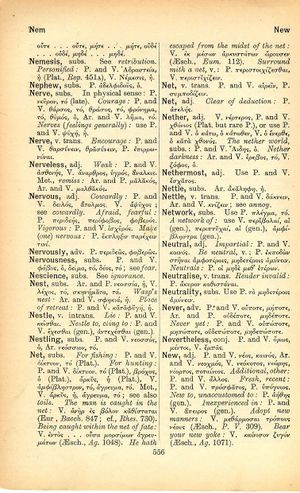nerve: Difference between revisions
From LSJ
ἀλλ’ οὔτε πολλὰ τραύματ’ ἐν στέρνοις λαβὼν θνῄσκει τις, εἰ μὴ τέρμα συντρέχοι βίου, οὔτ’ ἐν στέγῃ τις ἥμενος παρ’ ἑστίᾳ φεύγει τι μᾶλλον τὸν πεπρωμένον μόρον → But a man will not die, even though he has been wounded repeatedly in the chest, should the appointed end of his life not have caught up with him; nor can one who sits beside his hearth at home escape his destined death any the more
(CSV4) |
m (Woodhouse1 replacement) |
||
| Line 1: | Line 1: | ||
{{Woodhouse1 | {{Woodhouse1 | ||
|Text=[[File:woodhouse_556.jpg|thumb|link={{filepath:woodhouse_556.jpg}}]] | |Text=[[File:woodhouse_556.jpg|thumb|link={{filepath:woodhouse_556.jpg}}]] | ||
===substantive=== | |||
[[in physical sense]]: [[prose|P.]] [[νεῦρον]], τό (late). | |||
[[courage]]: [[prose|P.]] and [[verse|V.]] [[θάρσος]], τό, [[θράσος]], τό, [[φρόνημα]], τό, [[θυμός]], ὁ, [[Aristophanes|Ar.]] and [[verse|V.]] [[λῆμα]], τό. | |||
[[nerves]] ([[feelings generally]]): use [[prose|P.]] and [[verse|V.]] [[ψυχή]], ἡ. | |||
===verb transitive=== | |||
[[encourage]]: [[prose|P.]] and [[verse|V.]] [[θαρσύνειν]], [[θρασύνειν]], [[prose|P.]] [[ἐπιρρωνύναι]]. | |||
}} | }} | ||

